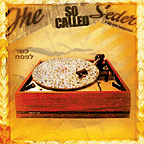So, an institution is holding a series of events featuring musicians who represent different parts of the Jewish music community. One of the musicians is a pop musicians of the sort (as near as I can tell) who sets religious poetry to current rock/pop sounds—the sort of thing that the Sephardic piyut writers did a thousand or two years ago in what is now Iraq.
To me, and to the organizers of the event, this was music best described as "Jewish Orthodox pop"—the qualifier added because it is music very much enjoyed by some parts of the halachic community, but which is unknown and generally making no impression outside that large community.
But, of course, I get an angry email, as though I wrote the concert description, demanding that I remove the word "Orthodox." I do as requested, but all the while, I think to myself, "hey turkey, you may want to pretend that this is music that speaks to the larger Jewish community, but it doesn't. So, you have just removed a signifier that will let that part of the community that isn't aware of your music, know that there is a concert of interest.
And maybe it matters, and maybe it doesn't. The term "Jewish music" as generally used these days, includes nothing but ditties of greater or lesser depth set to folk or pop or rock. If you listen to the sad sampler of "Jewish music" that Moment magazine distributed a year or so ago, there is no klezmer, no Ladino (not pop, not traditional, nada), no Yiddish, no music representing any Jewish folk or popular traditions outside the confines of allegedly "spiritual" music. It is a deadly awful CD, and convinced me that if Moment magazine is this clueless about Jewish music, it may be similarly clueless across the board. 20 years ago it was a great magazine. Today? Who mentions it.
And this Jewish musician? Maybe he belonged on that CD. Maybe he didn't. But I suspect strongly that trying to market his sound as "Jewish music" is the kiss of death across the board. And, of course, this is where I came in. I can't image a problem in describing nusakh as Jewish music, but once you set your words to popular melody? It may be many things, and it may certainly be part of Jewish music. It deserves description.
I titled this piece as though the artist was confused about the difference between "Orthodox" and "Jewish." As I write, I realize that this isn't necessarily so. From his perspective, as someone setting Jewish words to music (and regardless of which denomination you belong to (or think of as how you aren't Jewish), it s"Jewish music". But that simply isn't enough. Even if we were all Orthodox, given the variety of Jewish communities, it still wouldn't be enough, and without further qualification, it is as though the artist is announcing he doesn't see or hear anyone but his own sub-community as the normative Jewish community.
 I just heard last night that Theo Bikel, the acclaimed folksinger and actor, will be returning to KlezKanada (now in its 12th year) this coming summer.
I just heard last night that Theo Bikel, the acclaimed folksinger and actor, will be returning to KlezKanada (now in its 12th year) this coming summer. As I get ready to start the first seder, I find myself thinking about music for Passover. It is a holiday where I find myself singing loudly (to many people's distress) and often, but not one where there are so many recordings that come to mind.
As I get ready to start the first seder, I find myself thinking about music for Passover. It is a holiday where I find myself singing loudly (to many people's distress) and often, but not one where there are so many recordings that come to mind. Passover starts Monday night at sundown. Many of you will gather with friends and family for 4 cups of wine, 4 questions, and more dry, flat, unleavened bread than you'd care to think about. Socalled's Passover masterpiece: The Socalled Seder: A Hip Hop Haggadah is the perfect antidote to a seder as dry as the matzah you're going to eat. It makes a great Afikomen prize. Whether you drink the 4 cups or not, its a great sountrack to the first week of April.
Passover starts Monday night at sundown. Many of you will gather with friends and family for 4 cups of wine, 4 questions, and more dry, flat, unleavened bread than you'd care to think about. Socalled's Passover masterpiece: The Socalled Seder: A Hip Hop Haggadah is the perfect antidote to a seder as dry as the matzah you're going to eat. It makes a great Afikomen prize. Whether you drink the 4 cups or not, its a great sountrack to the first week of April.